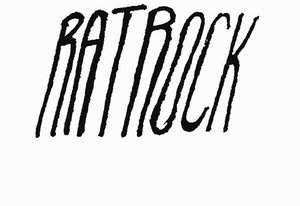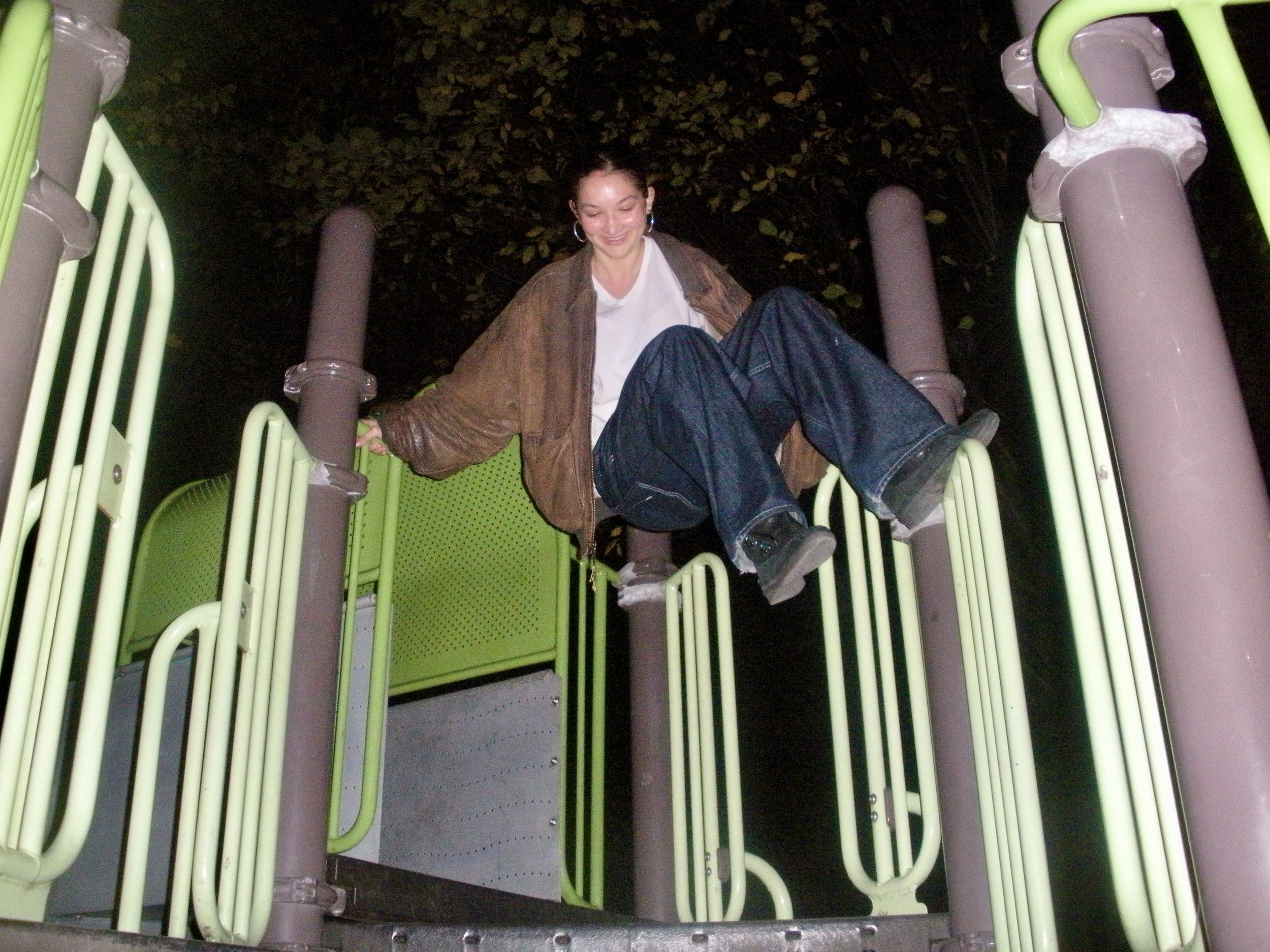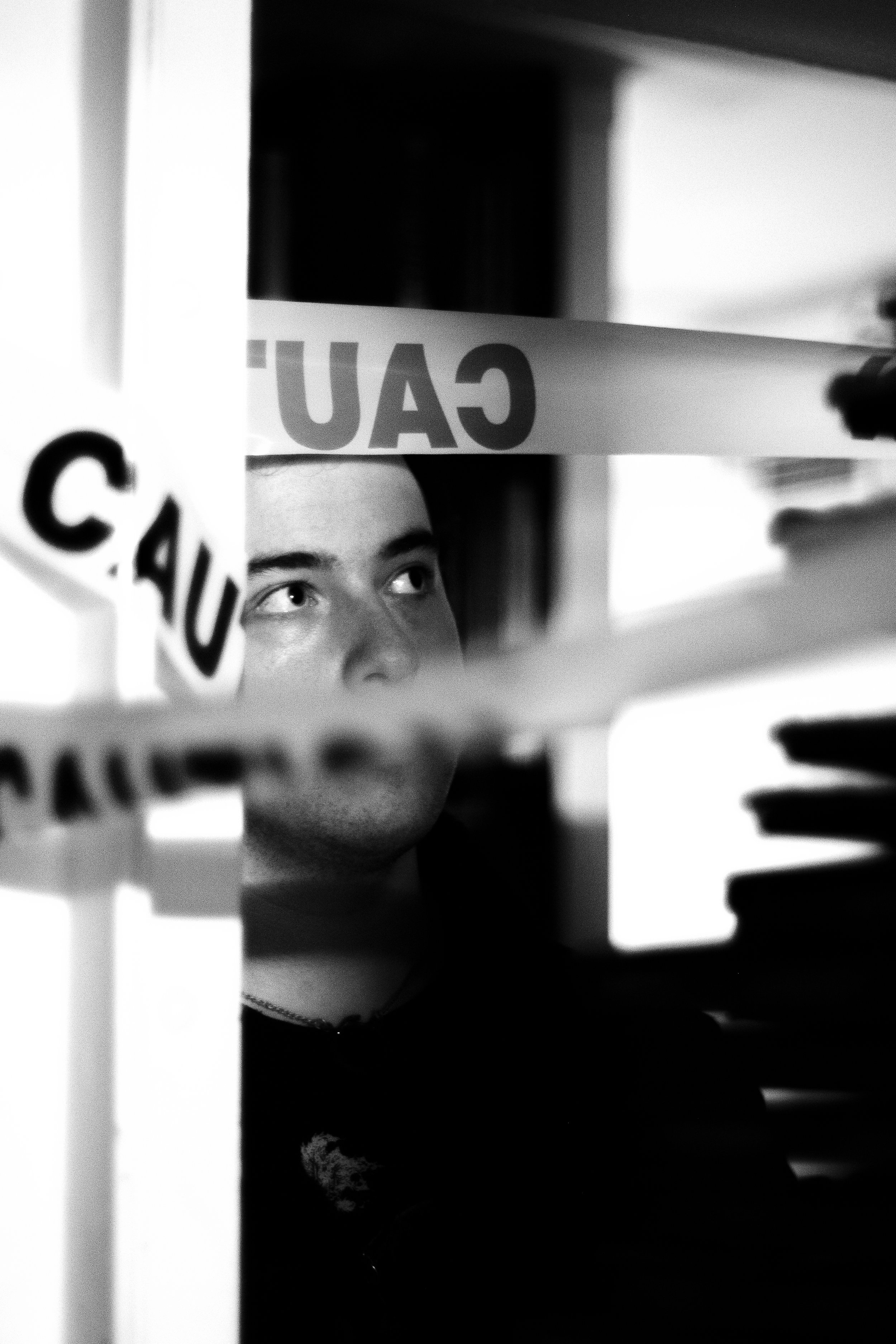Feature by Mara Toma
Photos by Chantel Hope










At the end of our conversation, Fatima gifted me a zine she had collaborated on: What grounds do we sprout from? We fought over who should buy the desserts at the Hungarian Pastry Shop. In the end, no desserts were bought.“Surrender” is the word Fatima searches up at some point in our conversation. Fatima’s writing is an intimate act of interrogation, construction, play, embodiment, and surrender. Fatima embodies all the beautiful writing she produces; perhaps that is why I wish our meeting to be seen not as a formal encounter but as a conversation devoid of structure. Fatima AlJarman is a Junior ‘26 at CC studying English and comparative literature.
MT — What is something that made you feel something today?
FA — Currently, I am working on an application for something and, of course, I am nervous. So I had an office hour with a professor, who is also an advisor at Quarto Magazine. We sat down and reviewed my answers to the applications together and his warmth was so comforting… It made me feel something because in the moment I realized that I really don’t care if I get in or not, I am just grateful that I have someone with whom I feel so safe having these exchanges.
MT— Your writing has something profoundly “embodied” about it. It feels very sensorial, nostalgic, yet very rooted in a particular moment in time. What does your writing mean to you and can you speak to this “embodied” quality of it?
FA –“Embodied” is such a good word and it resonates with me a lot. I think this is very connected to my writing process, or what I look like when I sit down to write. At some point, when I reach a very good moment like writing a really good sentence, or discovering a strange whimsical plot, it will feel like an out-of-body experience. In that state, I embody the reader’s position completely, I have no idea what is going to come next. Truly, every word comes and I will feel shocked by it. I’ll start to cry if it’s heartbreaking… if it’s about my mom, I’ll probably cry. It feels like something passes through and the fire is ignited and I've just set up the environment to prepare for a flame to explode. Something else is exploding but it is not me.
I think sometimes I write in search of them [these out of body experiences], but I would describe them as a state of euphoria. I often write in search of those moments and they don’t always come. I remember that I had one of those moments when I wrote the end of the first chapter of my novella— the part when the daughter says {“I wish I knew everything that I know now so that I could drive you where you are”}.So again, very far and few between—it comes when it comes and it does something crazy– and I don’t question it.
MT- What is your relationship with your own biography?
FA- For most of my life, I’ve had to tow the line between speaking and being silenced, and this balance has changed throughout the years. As a child, I was a shy little girl. Freshman year of college was a turning point. I had a very interesting conversation with a friend who, at the time, didn't know me very well. He nevertheless looked at me and said, “I feel like you are a really loud person but you shut yourself up.” I got a little scared because no one in my life had ever read me like that. Honestly, that switched something in my brain and I kept ruminating about this… am I actually this extroverted human who has been conditioned to be an introvert because of her upbringing as a woman, or perhaps her upbringing in “respectable society” that wants you to be poised, quiet, and reserved?
MT — When reading your pieces I felt that you were writing from a situated, autobiographical perspective. Can you speak to this concern with perspective, and perhaps even experimenting with the fluidity of point of view?
FA — Yes, but my perspective is morphed. People often take things at face value. Sometimes people will read and they will assume things about the characters—for example, they’ll read my ongoing novella and they’ll say things like that’s your mom and that you… but it’s not my mom and it’s not me. They are versions of a conception of a mother and a daughter. There is an element of fabrication to it— I am molding and creating characters. That’s something that I always have to emphasize, especially when dealing with the story of an Arab family. I think we are not given the privilege of existing in an imaginary and ephemeral sphere. People will often read the character and assume that this is exactly what it [being Arab] must be like. I think about this a lot; people truly speculate that the daughter is like me… maybe she is but maybe she's not. That’s why I like speculative fiction and autofiction. I like those subgenres because they allow me to explore what is real and not real at the same time, and push readers to bask in what is not real. I think our current culture sees everything that you write as factual or rooted to who you are, but, sometimes, I use writing to explore everything I am not. This goes back to your point about experimenting with the fluidity of point of view—that’s what makes fiction as a medium so powerful.
MT — Your writing deals with an element of construction, yet it is also highly fluid. You combine words with images, and print-making is often at the core of your craft. What is the significance of print-making in your work?
FA — Whenever I browse a book, I am the counter example of “don’t judge a book by its cover.” That is the unfortunate cost of aesthetics. I am really obsessed with the presentation of books. That obsession extends both to the paper, the binding, and any physicality you can think of. I think this obsession started when I was introduced to the concept of zines as a teen. It was a really empowering medium because it felt so accessible. I knew I could make a zine, and it could be a finalized project, and all I needed was A4 papers, a printer, and a pdf. In a couple of steps, I could make a little zine. I am really interested in experimenting beyond zine-making. I’ve been learning book-binding, so eventually I want to learn how to make a hard-cover book. I really want to learn all these technical skills because they feel very connected to how I see my writing.
Don’t get me wrong, I love a good printer and I will always support local printers, but I want to see what it’s like to do it all on my own. I think the act of book-making makes the experience more embodied and personal because my work doesn’t end with a pdf. As soon as I am done with my draft, that is just step one of a larger process.
MT– Something that attracted me to your printed materials was that your images are more descriptive than abstract– the prints themselves could be viewed as embodied glimpses of the writing, could they not?
FA- Thank you so much, I don’t want to take all the credit because “memory-book” or “intergenerational loneliness and other things i’ve inherited” (I haven’t decided on the title!), in particular, I worked very closely with my friend Mariam Almuheiri—the photography was all her. We weren’t interested in the abstract because everything that we were writing was still rooted in something real. The dishes that were being described were in the text, or the photograph. There were so many references to cite, whether it be a signpost, a piece of clothing, or the look in someone’s eye. It felt very important to make the publication a total experience for the reader.
MT- It seems that a lot of the characters you construct often live through one another or exist within larger multigenerational stories. Are you interested in vicarious experiences or, perhaps, how we live in multiple bodies at the same time? What about representing certain cultural moments?
FA – Maybe this is a personal reckoning but my distance from home makes me so conscious of my cultural upbringing, my Islamic upbringing, my hyper traditional upbringing. Now I am learning how to honor that upbringing and recognize the perspective that that offers me in a world where everybody is nurtured in a different way… maybe my characters represent a reflection into forms of nurturing. I hesitate to say that they represent different cultural moments because at the end of the day I am trying to craft characters that feel like people. Whether we like it or not, we will have cultural moments passing through. It is a difficult line to tow, it is something that I am trying to avoid doing, but it is also an effective need. Whether you are conscious of it or not, cultural experiences impact the way you exist in space.
MT- I want to go back to your project “an archive of grief,”and I want to ask why “archive?”
FA- In all honesty, I produced that project for an English class where we were studying archives. I remember researching the concept of an archive, and the origin of the word [archive] and being very fascinated. I love the image of an office full of metal cabinets that you open and there are files upon files of materials. Archives are kept “just in case–” this is usually the thought process behind it [archive]. That is how I felt when I was keeping track of what I was thinking and reading while I was writing about my brother’s death. This was all ‘just in case” I needed to go back… just in case… and I am finding that I do keep coming back to it.. I am glad that I had that intuition two years ago because it’s been a very valuable archive to return to. It is an artifact of a moment and emotion that I cannot access anymore. Truly, how I felt that year I don’t think I will ever feel again… it’s so unique and it is its own signature experience that I can only access through an artifact. It feels very connected to its purpose.
MT- I think we associate mourning, particularly in this cultural moment, as a consequence. But you were just talking to me about a perpetual sense of mourning. What does this perpetual mourning mean for you?
I currently exist between two places. When I am in the U.S., I am constantly mourning my life back home. I am mourning all of the changes in weather, every single type of rainfall, or every meal that my family cooked together that I will not have access to because I have decided to spend these years on my own. When I am back home, for whatever brief period, I constantly mourn my life here – my friends, my family, thinking of New York streets, Hungarian Pastry Shop, and all the desserts that I am not getting to taste. There is a constant mourning that I experience no matter where I am at because I am so conscious that, in a different moment, if I had chosen things differently, my life could have looked very different. It is the byproduct and beauty of having the ability to make choices… the beautiful privilege of being able to make choices. I know that I have made the choice to study abroad, but I want to also give myself the privilege of feeling what I need to feel instead of hiding or being ashamed of it. When I graduate, I will make another choice, and I will make choices for the rest of my life but I always want to hold the “what if” near to my soul.
MT– What would you say to someone who maybe wants to be a writer but is scared? How do you get to a point where the joy perhaps becomes a little bit more important than the pressure or the expectations?
FA– It is important to ask yourself why you want to write because, then, that will give you a sense of reflection as to what your expectations are. It is really easy, especially in our culture, to not want to do something unless we expect something grand at the end. I think it is so easy to fall into that, and we have all been trained for that mindset. What I would say to a fellow writer is: figure out why you want to write, and if you are writing for yourself then remember that it is only for yourself… no one will look at that page. If it is truly for your soul and for yourself, keep that in mind; we have to be honest and fearless. We have to get comfortable with gazing upon truths that are hard to bear. I think writing is a process of being very brave, even if it is something small that you have to be brave about.
What has been so helpful for me is to remove the agenda… every single time I felt that I wanted to write to win this major award, I would not write at all because I would be so horrified. However, every single time I accessed a piece without an agenda, I felt limitless.
I think that this is an important point of an interrogation for any writer: consider your agenda, question your agenda, and write without one.


































